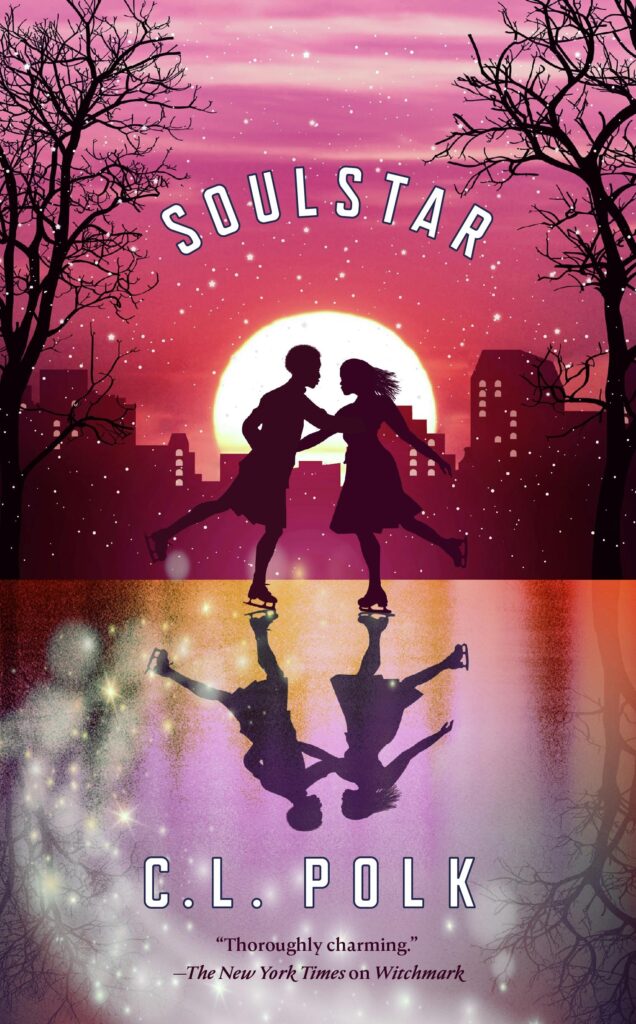Recently, C.L. Polk posted wistfully on social media, wishing that more people had read Soulstar. The book’s cover made it instantly recognizable as one of The Kingston Cycle, and I was startled and dismayed to realize that I had never actually finished that gaslamp-fantasy trilogy, although I loved Witchmark and Stormsong (and I’d already rave-reviewed Polk’s unrelated 2023 novella Even Though I Knew the End). Somehow I missed the 2021 conclusion. Anyway, once aware of this omission, I set out to rectify it. Happily, my local library came through rapidly via the Libby app, first with the audiobook; then, after I finished listening and decided I had to write about it, with the ebook (so I could more easily refer to details).
Even though I have a heavy reading schedule of new books for Skiffy and Fanty, it was absolutely worth the time to go back and read Soulstar. Although I suppose it’s technically possible to jump into the series with this book, I highly recommend reading the trilogy from the beginning if you’re new to it, due to complex worldbuilding and recurring characters. However, I did not take the time to reread the first two books that I read in 2019-2020 before starting the conclusion, and I didn’t have any trouble understanding the plot and picking up nuances.

Soulstar examines the world of Witchmark from new perspectives (a middle-aged protagonist from a less privileged background [third-person past tense] and the people she talks with) and continues the plotlines from the first two books by expanding both the politics and the worldbuilding even further. Commoner (?) Robin Thorpe has the center focus, with nobles Miles and Grace from the first two books acting more peripherally to the plot. She is a strong woman, but tired from struggling all her life, working as a nurse, supporting her family/House, helping to run the administration of a liberal party, and secretly practicing witchcraft (including talking with ghosts); now, with witchcraft legalized again, and other major changes in the wind, she digs deep to make the right choices for herself, her people, her party, and her country — and, after some false steps, to share those decisions with others — including her long-lost love, who’d been locked up in a witch “asylum” decades ago.
Most of that is apparent from the publisher’s summary of Soulstar. However, since this book came out three years ago, I’m going to include some major spoilers in my review now. In Witchmark, Miles was mainly struggling to keep his own freedom, as a secret witch/healer; then in Stormsong, having been brought to realize the unfairness of the system, his sister Grace fought to reform it, both for justice and to gather enough resources to shield Aeland from a monstrous looming blizzard. Now, in Soulstar, after a political assassination forces Grace’s ally Robin to step up from a support role to become a Solidarity leader, she comes to realize that even major reforms can be fragile within a corrupt system, and so the only way to really protect people from noble and royal abuses is revolution.
I was really interested in the character of King Severin. As a prince, he’d been supposed to be a preferable, reformist alternative to his mother the queen, who’d imprisoned the witches in the first place (and allowed them to be drained as magical power-batteries to sustain Aeland); however, once installed, he’s alarmed by the desired speed of reform and tries to crack down on protests. It’s true that he has some nasty characters trying to influence him, but he also makes some heinous decisions on his own, partly to keep things under his control, but also partly because he thinks he deserves to be loved, and he thinks he is owed more credit for his good intentions.
“You couldn’t see that as king, I would steer our course toward reform, that my rule would be good for you?” He looked at me with hurt in his eyes. “I had so many plans. Why didn’t you trust me?
“Because we’re asking for so much more,” I said. “Because a good king is still a king.”
I’m reminded of a quote and of a book. From Daniel Webster: “There are men in all ages who mean to govern well, but they mean to govern. They promise to be good masters, but they mean to be masters.”
The book I’m reminded of is The Emperor: Downfall of an Autocrat, by Ryszard Kapuscinski, about Haile Selassie of Ethiopia. Italy’s 1935-1941 invasion and partial rule of Ethiopia was of course completely unjustified, but that doesn’t mean Haile Selassie was a good ruler after his return to power. From my 2018 review of this 1978 book:
“He also disapproved of any efforts at reforms made by anyone other than himself; apparently, he alone was to be the dispenser of mercy, justice, and any improvements in the people’s lives; he alone was to be their father-figure, their savior.”
So King Severin is sadly a believable character, although awful. The revolution here may seem a little too fast and relatively bloodless, but sometimes sweeping political changes do come about incredibly rapidly in reality. I do really appreciate that what starts out as an Edwardian-style gaslamp-fantasy monarchy setting, where only monied people can even vote for Parliament, evolves into an actual democracy. Too many fantasies just take monarchical/empirical rule for granted, and the only “political” struggle is trying to replace a bad king/ruler with a hopefully better one.
Moving on from politics, I love the romance in this book. Robin and Zelind were childhood sweethearts, but just after their marriage (opposing Zelind’s rich, powerful mother’s wishes), Zelind was betrayed and imprisoned as a witch, and Robin was never allowed to visit. Now that all the witches have been freed, they finally get to live together as spouses, but it’s a difficult adjustment in several ways. They are mostly very careful and considerate of each other, but communication can be difficult, and Robin, having lived her own life for decades, initially assumes that the just-freed Zelind will simply support Robin’s activities instead of having any other interests.
I’ll warn listeners to the audiobook about Zelind’s pronouns. While listening, I thought Polk was switching from male pronouns to female pronouns in referring to Zelind, to reflect a nonbinary identity, within paragraphs and even within sentences [e.g. “He got to her feet…”], and I found it very jarring when I kept wondering if there was another person in the room. Upon reading the ebook, I saw that the pronouns were khe/kher, with the kh being a sort of guttural aspiration, which is why I misheard it as he/her. So it’s fine in the book, actually. But there are certain accents and intonations that are enhanced by Robin Miles’ narration (emphasizing class distinctions, for example), so the audiobook is also good, as long as the listener realizes what I didn’t about those pronouns.
There are a lot of other interesting elements in the book, from biased police interrogations, to efforts to find alternative energy sources to witch power (and efforts by some to maintain a utility monopoly), to an inheritance squabble when the sole heir of a dwindling clan resents the matriarch’s welcoming of many witch-asylum refugees into their mansion, to public relations battles, including a scandal over a polygamous marriage. Polk weaves together elements of a wonderfully complex society and competing interests to create a fascinating, and very heartening, story of justice, freedom, and love. It’s a great ending to a wonderful trilogy, and I strongly recommend it.
Content warnings: Death, violence, police violence and other oppression, references to past harms to children, forced breeding, etc.
Disclaimers: None. Support your local library!







